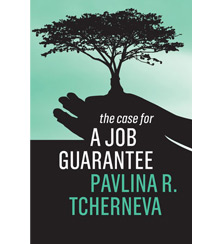What if every job seeker got a living-wage job?
Economist Pavlina R. Tcherneva demolishes the idea that there is an optimal rate of unemployment and makes a timely case for a national job guarantee.
The Case for a Job Guarantee
by Pavlina R. Tcherneva, Polity Press, 2020
It’s usually eye-opening when the economic assumptions that underlie a society are questioned. In The Case for a Job Guarantee, by Pavlina R. Tcherneva, an associate professor of economics at Bard College and a research scholar at the Levy Economics Institute, that assumption is embedded in the concept known as the non-accelerating inflation rate of unemployment (NAIRU).
NAIRU assumes that when the unemployment rate gets too low, it will force companies to raise wages and then prices, causing inflation. This leads economists to try to suss out the optimal rate of unemployment, and the Federal Reserve to try to slow investment and hiring whenever the ranks of the unemployed grow too thin — cold comfort when you are in those ranks.
“The idea that involuntary unemployment is an unfortunate but unavoidable occurrence, and that there is an appropriate level of unemployment necessary for the smooth functioning of the economy, is among the great, unexamined myths of our time,” declares Tcherneva in this concise polemic. “It is also bad economics.”
The actual nature of the relationship between unemployment and inflation is an unsolved mystery, according to Tcherneva. Moreover, the Fed has no “reliable” theory of inflation — even though the Fed began to claim, starting in 2014, that the U.S. economy was at full employment. (Never mind the 3 to 4 million people who were unemployed and seeking work.)
The assumption that there is an optimal level of unemployment comes with harsh ramifications. Unemployed people are less healthy and suffer higher rates of suicide and mortality. Their lifetime earnings shrink, and they often must be supported by social welfare programs as they try to find to work. Chronic unemployment causes communities to decline and collapse. In macroeconomic terms, unemployment depresses GDP growth — Tcherneva cites an analysis by Australian economist Bill Mitchell, who calculated a decline of nearly US$10 billion in output per day caused by unemployment during the Great Recession in the U.S. (versus output if the “full” employment rate at 2.8 percent per annum average GDP growth of 2003–07 had held).
“What if we changed all that,” asks Tcherneva, “and made it a social and economic objective that no job seeker would be left without (at a minimum) decent living-wage work?” The solution she strongly advocates is a job guarantee: a commitment by the government to provide everyone who wants to work with a job. If a job is not available in the private sector, it will be provided in the public sector.
What if we made it a social and economic objective that no job seeker would be left without (at a minimum) decent living-wage work?”
The money required to fund these jobs in the U.S would be provided by the federal government, and the states would administer them through their existing networks of unemployment offices. “Imagine that you go back to the unemployment office,” writes Tcherneva, “but this time, in addition to every other resource it offers, it also produces a list of local public service jobs, each offering a basic wage (say $15/hour), healthcare, and affordable quality childcare.”
Not only would such a program truly produce full employment, but it would enable state and local governments (and qualified nonprofits) to staff worthy projects that they can’t afford: infrastructure maintenance and improvements, school programs, outreach programs for at-risk populations, community health clinics. As significant as the unemployed getting employed and the work they would do, is the effect of an hourly $15 wage floor on the rest of the economy. “Working people need enforceable wage laws,” writes Tcherneva, “but they also need the assurance of an accessible living-wage option.” Now they would have it. Because to hire people, private companies would need to match the wage provided by the public job guarantee.
These are compelling benefits, but as you might expect, there are many arguments against a job guarantee: the immense cost, the sanctity of so-called free markets, the dangers of socialism. Tcherneva devotes much of this book to debunking those arguments, and she does a terrific job of it. But like universal healthcare, the prospect of a job guarantee always comes back to our collective willingness to share the economic riches we all have a hand in producing. (I, for one, don’t have much faith in that willingness, but I’m willing to be proved wrong.)
The impact of COVID-19 on unemployment wasn’t yet revealed when Tcherneva wrote this book (and it still isn’t fully revealed). But it does seem obvious that a job guarantee wouldn’t protect workers from the nearly instantaneous rise to double-digit unemployment caused by the pandemic. If it isn’t safe to go to work in the private sector, it isn’t going to be safe to go to work in the public sector. And although some people in both sectors will be able to work remotely, many won’t. A guaranteed job won’t change that.
Nevertheless, a job guarantee would help alleviate much of the pain that will accrue if the pandemic does not subside soon and the much-hoped-for V-shaped recovery does not materialize, as now seems increasingly probable. In that case, a lengthy recession is likely, and many companies will cut jobs in response to depressed revenues and earnings. But if we had a job guarantee, instead of suffering through another decade-long jobless recovery, unemployed workers would be able to avail themselves of public-sector jobs — just as workers did in the Great Depression, thanks to the Works Progress Administration, which employed 8.5 million Americans between 1935 and 1943.
Today, nine decades after Franklin Delano Roosevelt began instituting his New Deal, the Green New Deal includes a job guarantee. Pavlina Tcherneva makes a strong case that it’s an idea whose time has come again.
Author profile:
- Theodore Kinni is a contributing editor at strategy+business. He also blogs at Reading, Writing re: Management and is @TedKinni on Twitter.





